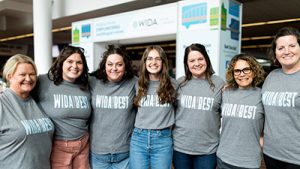The WIDA Annual Conference is truly a conference by teachers, for teachers. The 2024 WIDA Annual Conference featured nearly 200 presenters, with about 75% of sessions facilitated by educators or administrators. More than 1,000 people joined virtually and 1,500 attended in person in Pittsburgh, Pennsylvania, for a week of learning, growth, and camaraderie.
 This was the 11th year of the WIDA Annual Conference, with educators from 45 states and territories in attendance. Some teachers have been part of the journey since the beginning, such as Maggie Churchill, who marked her 10th year as a WIDA presenter.
This was the 11th year of the WIDA Annual Conference, with educators from 45 states and territories in attendance. Some teachers have been part of the journey since the beginning, such as Maggie Churchill, who marked her 10th year as a WIDA presenter.
“Before we started this conference, I heard from educators out in the field that they wished there was a conference that specifically focused on multilingual learners in PreK-12,” Tim Boals, WIDA founder and director, said as he opened the keynote session. “Now, here we are gathered for the 11th year of a conference that does just that!”
Tangible takeaways
This year’s conference was full of resources, advice, and instructional practices for teachers to take back to the classroom.
One session, “How and Why We Stay: Ingredients for ML Teacher Longevity,” featured two long-time educators, Catriona Moore and Kathryn Gimse, looking back on their careers to find their throughlines for professional resiliency.
They proposed three “ingredients” to their longevity: classroom projects that generate joy and engagement, relationships and connections, and unexpected learning experiences. Moore and Gimse argued that these elements come together to create meaningfulness in a career.
During the “Putting the Advancing ALTELLA Toolkit into Practice!” workshop, Madison Leech, Laurene Christensen, and Vitaliy Shyyan gave practical advice on how to use Advancing ALTELLA and WIDA resources to support multilingual learners with the most significant cognitive disabilities.
“This session alone made the entire WIDA Annual Conference worth it,” a workshop attendee said.
Leech, who is a school administrator and longtime Advancing ALTELLA expert, showed attendees how to combine elements of the Advancing ALTELLA Toolkit No. 1, the brand-new Advancing ALTELLA Objective Focus Sheet, and the WIDA Alternate Proficiency Level Descriptors and Alternate Can Do Descriptors to create and scaffold a lesson plan for multilingual learners with the most significant cognitive disabilities.
Quiara Alegría Hudes’ keynote highlights how language is at the center of all endeavors.
The week kicked off with high energy as attendees heard from this year’s keynote speaker, Quiara Alegría Hudes. She is the Pulitzer Prize-winning playwright of “Water by the Spoonful,” author of the memoir “My Broken Language,” and screenwriter for the major motion picture “In the Heights.” Hudes grew up in a multilingual home where language “lit [her] up as a child.”
Hudes shared her journey, which was beautifully aligned with the theme of this year’s conference, “Bridging cultures, empowering multilingual voices.”
“No one in my family spoke the same level of English or Spanish,” she said. “There were other languages that bridged those gaps, like body language.”
Hudes started and ended her speech with a passage from “My Broken Language.” Some of these passages explored her adolescence in Philadelphia, Pennsylvania, where language, culture, and community shaped who she is today.
“If you are fluent in a language, then there is a place where you belong,” she said.
Hudes dove into pivotal moments of her career. She discussed the creation of “In the Heights,” from writing the book of the musical to being on set during the creation of the film. She spoke about her family and how language is “the best sandbox in the world.” It’s a place she loves to play.
First ever virtual keynote
For the first time, over 1,000 people joined the conference online and heard a unique keynote just for virtual attendees. The speaker, Jo Napolitano, has spent nearly two decades reporting for the New York Times, Chicago Tribune, and Newsday.
She shared her and her family’s story, and the impact education had on her.
“Education catapulted me, in just one generation, from one of the lowest castes in the world to the American middle class,” Napolitano said.
Napolitano, an immigrant herself, was born in Bogota, Colombia, and was adopted by a blue-collar family in New York. She’s now a reporter at The 74 and has written extensively about refugees and immigrants. She shared some of this reporting in her keynote, including an article on displaced people from Ukraine published in The Guardian and the investigative story “Hundreds of U.S. High Schools Wrongfully Refused Entry to Older, Immigrant Student” in The 74.
Through her own story and the stories she’s helped tell of immigrants and refugees, Napolitano painted an inspiring picture of the power of education and the importance of advocating for students.
“We need to assume greatness in the kids that come to this country looking for our help,” Napolitano said. “We need to assume they have talents and help them grow them.”
Closing session and inspiration to take home
The 2024 WIDA Annual Conference closed with two special guest speakers, Trish Morita-Mullaney and Edward Steinman, on the fight for bilingual education in the U.S. They walked attendees through the history of Lau v. Nichols, which affirmed that multilingual students have a right to meaningful participation in educational programs. Steinman argued the case in front of the Supreme Court of the United States and Morita-Mullaney wrote a book about it.
Knowing this history is essential. Morita-Mullaney and Steinman’s passion for multilingualism and multilingual education was palpable and an inspiring way to wrap up what WIDA hopes was an uplifting week for all who joined us.